Court approves deposit of unclaimed clients’ assets after exhaustive efforts for Securities House ceasing business
- Anna Lau

- Aug 27, 2025
- 3 min read
Updated: Sep 9, 2025
The Hong Kong Court has upheld and recognised the trustee relationship between securities brokerage firms and their clients. In the event that a brokerage firm intends to cease business, it needs to return the assets (including cash and/or securities) back to their clients in order to discharge their duties as a trustee. But what if some clients remain uncontactable or have passed away and no representatives have been appointed for their estate?
This article discusses the firm’s recent representation of a securities house in their application for leave to deposit unclaimed clients’ assets into the Court after recognising exhaustive efforts have been made to locate and contact the clients.
Authors: Anna Lau, Partner and Lilie Tung, shadowing intern
Legal Principles on Assets held on Trust
An application for leave to deposit unclaimed clients’ assets into the Court must be made under Sections 56 and 62 of the Trustee Ordinance (Cap. 29) and Order 92 of the Rules of the District Court (Cap. 336H). It is considered a “flexible and pragmatic” solution for securities houses upon cessation of business. At the same time, it provides time to deal with unclaimed assets in a way which protects the interests of their clients.
Given the uncontactable status of these clients, the application is usually conducted on an ex parte basis. The applicant shall demonstrate (1) the unclaimed assets are held by it as trustee, and (2) reasonable endeavours have been made to contact the clients and their representatives/beneficiaries.
Re Fairwin Broking Limited [2025] HKDC 1066
In this case, the Applicant had been in the securities brokerage business since 1994. Despite making countless efforts to contact their clients, including sending letters, emails, making telephone calls, publishing newspaper advertisements and website announcements, as well as visiting the last known addresses of the clients, 36 clients remained unresponsive and failed to withdraw or forfeit their unclaimed cash and/or securities.
At the initial hearing, the Judge expressed concern as to whether the Court had the required jurisdiction to make an order regarding securities for which the clients had signed and returned notices of forfeiture. The Judge also raised requisitions on the costs order, given that some clients incurred more costs due to more tracing attempts or communications, for example newspaper advertisement for one particular client compared to uncontactable clients. A more reasonable and fair apportionment of cost upon different clients would be more preferrable.
At the second hearing, Ravenscroft & Schmierer successfully represented the Applicant in establishing that court deposits for unclaimed client assets would discharge the brokerage’s trustee duty. This included cash and securities after deducting the legal costs and expenses for placing a newspaper advertisement in Hong Kong and Canada to notify the uncontactable clients.
To satisfactorily answer the Judge’s requisitions, Ravenscroft & Schmierer sought directions on apportioning the costs for different categories of clients and redacting the personal information from the order to be served on individual clients. Ravenscroft & Schmierer also liaised with CCASS on behalf of the Applicant to deal with the securities that were confirmed to be forfeited by the clients.
Key Takeaway
Despite unsuccessful attempts at contacting the clients, Ravenscroft & Schmierer had advised and assisted the client to demonstrate reasonable endeavours in contacting these clients. It is also necessary to use innovative ways to overcome challenges and requisitions in order to persuade the Court that the Applicant has fulfilled its duties as a trustee.
Anna Lau of Ravenscroft & Schmierer was the advocate for the Applicant in this case. The full judgment can be accessed via this link (click, PDF document opens in new window).
Disclaimer: This publication is general in nature and is not intended to constitute legal advice. You should seek professional advice before taking any action in relation to the matters dealt with in this publication.
For specific advice about your situation, please contact:

Partner
+852 2388 3899



Comments